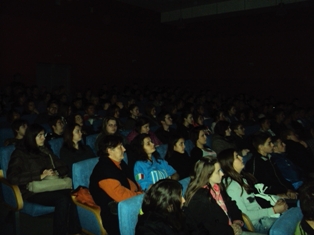In July 2013, UN Secretary-General’s UNiTE campaign tackling violence against women announced every 25th in month to be the Orange Day. This was initiated by the UNiTE global youth network, and the activities implemented by the UN at the national level in collaboration with non-governmental associations dealing with violence against women and girls are not just once a year on November 25, but each month (on International Day for the Elimination of Violence Against Women and Girls)
Through Orange Day campaign, the Institute for Youth Development KULT is trying to make daily topics in personal thoughts and discussions out of gender inequality, violence as the most brutal form of human rights violation, public health crisis and obstacles in development, safety and peace. November 25 and March 8 cannot be the dates when the gender-equality switch is on. Behind the switch, the situation is alarming before and after these dates. Let us empathize with the violence victims, think and react to the disturbing noises from the apartment next door, protect ourselves, warn the ones next to us, forward the messages to those around us, contribute gender-based violence prevention in general.
Orange Day campaign accentuates recommendations from the agreed conclusions on the elimination and prevention of all forms of violence against women and girls at the 57th Session of the Commission on the Status of Women.
The subject of this month’s Orange Day campaign and the global #OrangeDay is violence against girls.
VIOLENCE AGAINST THE GIRL CHILD
Girls play multiple roles in the household, society and economy, yet are discriminated against from the earliest stages of life, throughout childhood. This can hold back their progress, prevent them from enjoying their human rights and make them more likely to face violence.
Violence against girls is perpetrated by both adults and peers and takes place in all social spaces, both public and private, including the home, the classroom, on the way to school, and online. It has immediate and long-term consequences and creates additional obstacles to girls’ progress.
In emergency situations, girls may face rape, forced prostitution, forced pregnancy and sexual slavery as tactics of war, and as a result of war-related instability and conflict. Girls are trafficked mainly for commercial sexual exploitation and domestic service, the hidden circumstances of which put them at greater risk from violence. Emerging new approaches in media and technologies have increased girls’ access to information and opportunities for political participation, though technological progress has also exposed girls to new risks including from sexual harassment, sexual exploitation and psychological violence.
Millions of girls are subjected to “harmful practices” including female genital mutilation, and early, forced and child marriage. More than 130 million girls and women worldwide have experienced some form of female genital mutilation in 29 countries in Africa and the Middle East, where it is most commonly practiced. Worldwide, more than 700 million women alive today were married as children, 250 million of whom were married before the age of 15. Girls who marry before the age of 18 are less likely to complete their education and more likely to experience domestic violence, while young teenage girls are more likely to experience complications in pregnancy and childbirth than women in their 20s.
Children marriage is a human rights violation in and of itself, but also prevents girls from enjoying other rights.
Multiple international laws, standards and goals address violence against the girl child including the Convention on the Rights of the Child, 1989, and the Convention on the Elimination of All Forms of Discrimination against Women, 1979. The Beijing Platform for Action, the blue print for advancing women’s rights which will be 20 years old next year, recognizes the girl child as one of its critical areas and highlights the need to eradicate violence against the girl child. If the aspirations from the Beijing
Platform for Action for women and girls are to be realized, the new global development agenda which will replace the Millennium Development Goals must tackle discrimination and violence against girls, and emphasize girls’ empowerment.














Leave a comment